Hospitality Industry Report: Structure, Skills, and Economic Impact
VerifiedAdded on 2020/11/12
|10
|2642
|210
Report
AI Summary
This report provides a comprehensive overview of the hospitality industry, focusing on its structure, scope, and economic contributions. The report begins by examining the different types of businesses within the industry, including lodging, food and beverage, travel and tourism, entertainment, and timeshares, using the London Hilton on Park Lane as a case study. It then delves into the operational and functional departments within a hotel, such as the rooms division, food and beverages division, sales, marketing, accounting, maintenance, human resources, and general management. The report also highlights the hospitality industry's significant contributions to local, national, and international economies. Furthermore, the report explores current and anticipated skills requirements, investigating various operational roles, including executive, front desk, housekeeping, and catering. It also examines the skills needed for each role and addresses the current skills shortages within the industry. Overall, the report offers valuable insights into the complexities and dynamics of the hospitality sector.
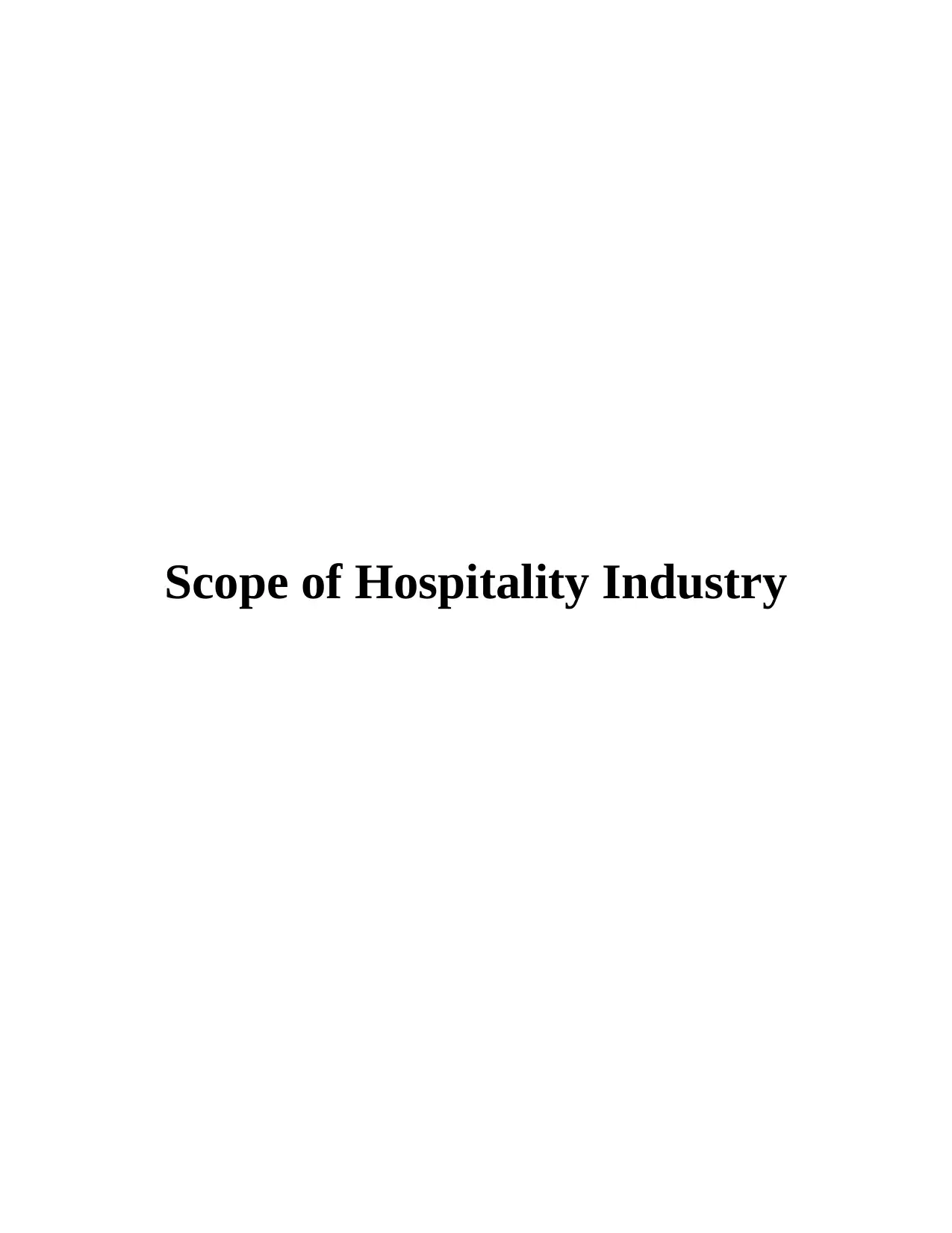
Scope of Hospitality Industry
Paraphrase This Document
Need a fresh take? Get an instant paraphrase of this document with our AI Paraphraser
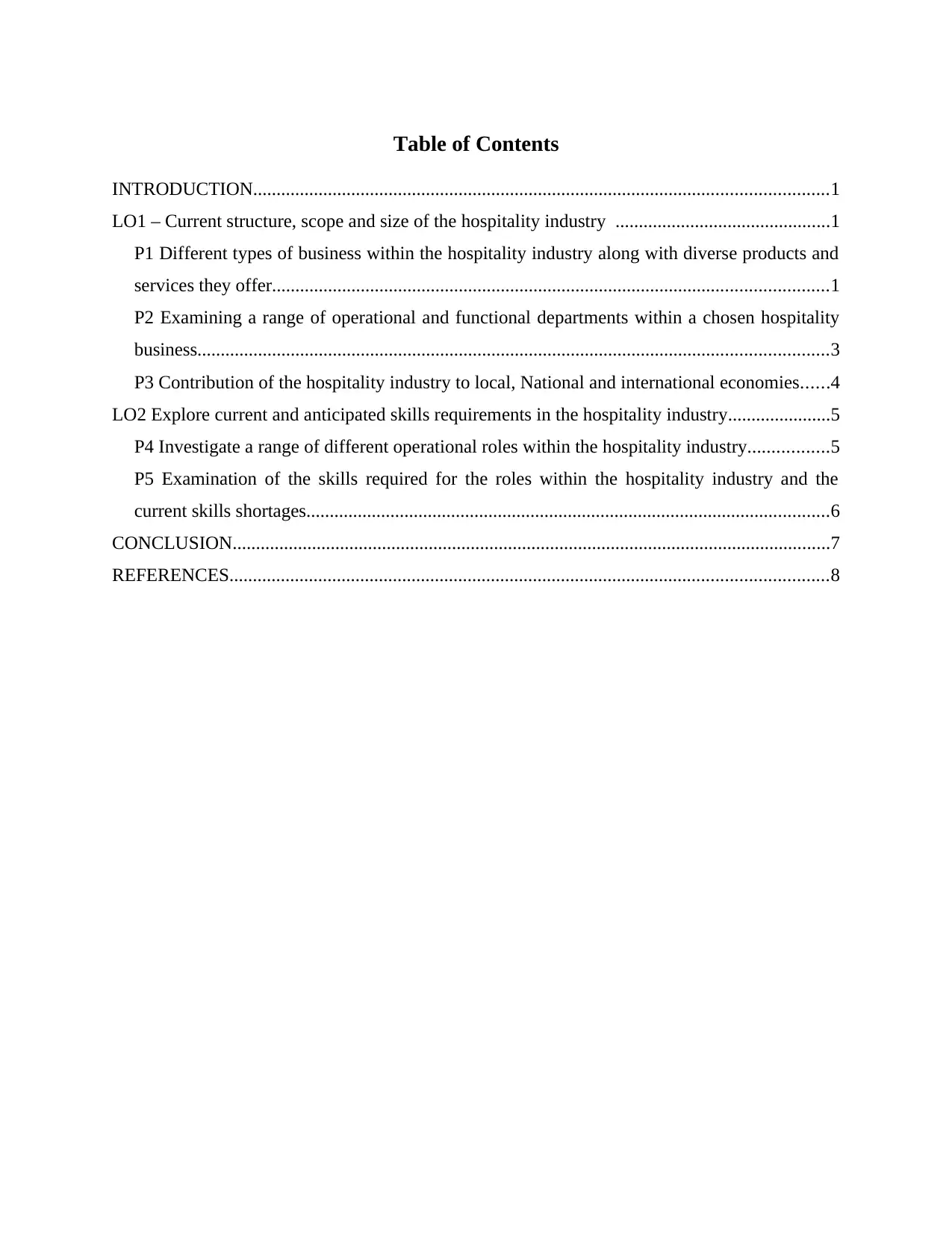
Table of Contents
INTRODUCTION...........................................................................................................................1
LO1 – Current structure, scope and size of the hospitality industry ..............................................1
P1 Different types of business within the hospitality industry along with diverse products and
services they offer.......................................................................................................................1
P2 Examining a range of operational and functional departments within a chosen hospitality
business.......................................................................................................................................3
P3 Contribution of the hospitality industry to local, National and international economies......4
LO2 Explore current and anticipated skills requirements in the hospitality industry......................5
P4 Investigate a range of different operational roles within the hospitality industry.................5
P5 Examination of the skills required for the roles within the hospitality industry and the
current skills shortages................................................................................................................6
CONCLUSION................................................................................................................................7
REFERENCES................................................................................................................................8
INTRODUCTION...........................................................................................................................1
LO1 – Current structure, scope and size of the hospitality industry ..............................................1
P1 Different types of business within the hospitality industry along with diverse products and
services they offer.......................................................................................................................1
P2 Examining a range of operational and functional departments within a chosen hospitality
business.......................................................................................................................................3
P3 Contribution of the hospitality industry to local, National and international economies......4
LO2 Explore current and anticipated skills requirements in the hospitality industry......................5
P4 Investigate a range of different operational roles within the hospitality industry.................5
P5 Examination of the skills required for the roles within the hospitality industry and the
current skills shortages................................................................................................................6
CONCLUSION................................................................................................................................7
REFERENCES................................................................................................................................8
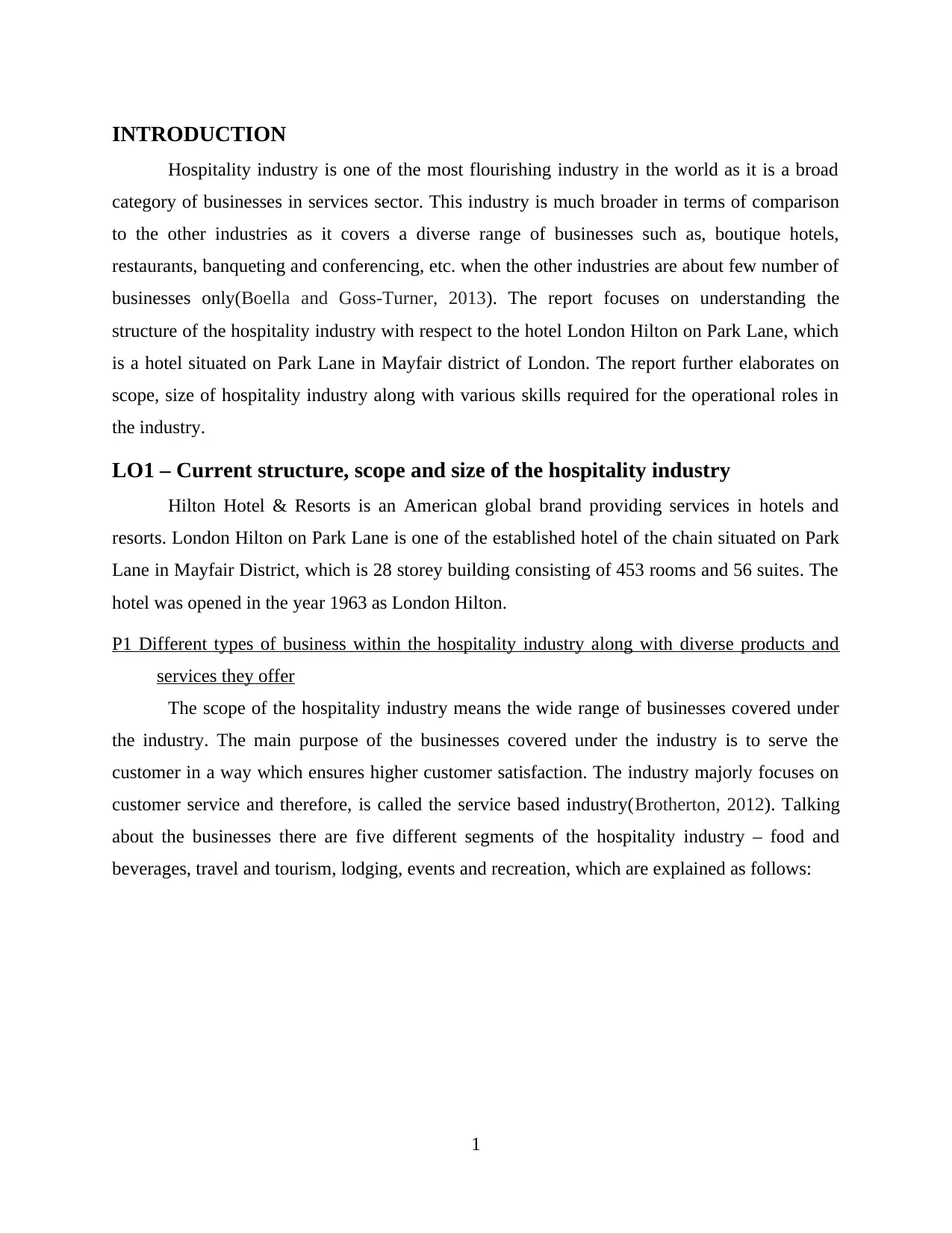
INTRODUCTION
Hospitality industry is one of the most flourishing industry in the world as it is a broad
category of businesses in services sector. This industry is much broader in terms of comparison
to the other industries as it covers a diverse range of businesses such as, boutique hotels,
restaurants, banqueting and conferencing, etc. when the other industries are about few number of
businesses only(Boella and Goss-Turner, 2013). The report focuses on understanding the
structure of the hospitality industry with respect to the hotel London Hilton on Park Lane, which
is a hotel situated on Park Lane in Mayfair district of London. The report further elaborates on
scope, size of hospitality industry along with various skills required for the operational roles in
the industry.
LO1 – Current structure, scope and size of the hospitality industry
Hilton Hotel & Resorts is an American global brand providing services in hotels and
resorts. London Hilton on Park Lane is one of the established hotel of the chain situated on Park
Lane in Mayfair District, which is 28 storey building consisting of 453 rooms and 56 suites. The
hotel was opened in the year 1963 as London Hilton.
P1 Different types of business within the hospitality industry along with diverse products and
services they offer
The scope of the hospitality industry means the wide range of businesses covered under
the industry. The main purpose of the businesses covered under the industry is to serve the
customer in a way which ensures higher customer satisfaction. The industry majorly focuses on
customer service and therefore, is called the service based industry(Brotherton, 2012). Talking
about the businesses there are five different segments of the hospitality industry – food and
beverages, travel and tourism, lodging, events and recreation, which are explained as follows:
1
Hospitality industry is one of the most flourishing industry in the world as it is a broad
category of businesses in services sector. This industry is much broader in terms of comparison
to the other industries as it covers a diverse range of businesses such as, boutique hotels,
restaurants, banqueting and conferencing, etc. when the other industries are about few number of
businesses only(Boella and Goss-Turner, 2013). The report focuses on understanding the
structure of the hospitality industry with respect to the hotel London Hilton on Park Lane, which
is a hotel situated on Park Lane in Mayfair district of London. The report further elaborates on
scope, size of hospitality industry along with various skills required for the operational roles in
the industry.
LO1 – Current structure, scope and size of the hospitality industry
Hilton Hotel & Resorts is an American global brand providing services in hotels and
resorts. London Hilton on Park Lane is one of the established hotel of the chain situated on Park
Lane in Mayfair District, which is 28 storey building consisting of 453 rooms and 56 suites. The
hotel was opened in the year 1963 as London Hilton.
P1 Different types of business within the hospitality industry along with diverse products and
services they offer
The scope of the hospitality industry means the wide range of businesses covered under
the industry. The main purpose of the businesses covered under the industry is to serve the
customer in a way which ensures higher customer satisfaction. The industry majorly focuses on
customer service and therefore, is called the service based industry(Brotherton, 2012). Talking
about the businesses there are five different segments of the hospitality industry – food and
beverages, travel and tourism, lodging, events and recreation, which are explained as follows:
1
⊘ This is a preview!⊘
Do you want full access?
Subscribe today to unlock all pages.

Trusted by 1+ million students worldwide
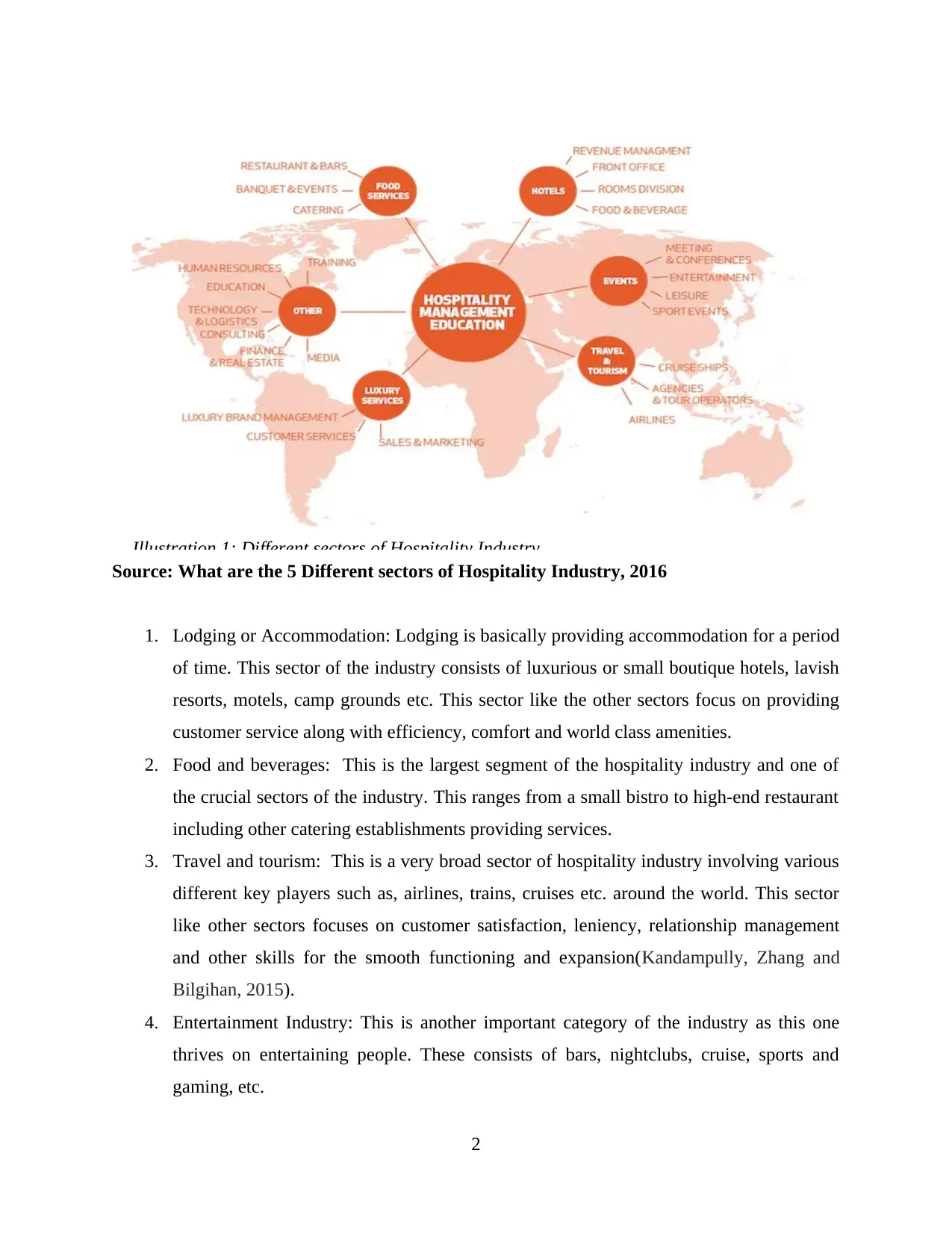
Source: What are the 5 Different sectors of Hospitality Industry, 2016
1. Lodging or Accommodation: Lodging is basically providing accommodation for a period
of time. This sector of the industry consists of luxurious or small boutique hotels, lavish
resorts, motels, camp grounds etc. This sector like the other sectors focus on providing
customer service along with efficiency, comfort and world class amenities.
2. Food and beverages: This is the largest segment of the hospitality industry and one of
the crucial sectors of the industry. This ranges from a small bistro to high-end restaurant
including other catering establishments providing services.
3. Travel and tourism: This is a very broad sector of hospitality industry involving various
different key players such as, airlines, trains, cruises etc. around the world. This sector
like other sectors focuses on customer satisfaction, leniency, relationship management
and other skills for the smooth functioning and expansion(Kandampully, Zhang and
Bilgihan, 2015).
4. Entertainment Industry: This is another important category of the industry as this one
thrives on entertaining people. These consists of bars, nightclubs, cruise, sports and
gaming, etc.
2
Illustration 1: Different sectors of Hospitality Industry
1. Lodging or Accommodation: Lodging is basically providing accommodation for a period
of time. This sector of the industry consists of luxurious or small boutique hotels, lavish
resorts, motels, camp grounds etc. This sector like the other sectors focus on providing
customer service along with efficiency, comfort and world class amenities.
2. Food and beverages: This is the largest segment of the hospitality industry and one of
the crucial sectors of the industry. This ranges from a small bistro to high-end restaurant
including other catering establishments providing services.
3. Travel and tourism: This is a very broad sector of hospitality industry involving various
different key players such as, airlines, trains, cruises etc. around the world. This sector
like other sectors focuses on customer satisfaction, leniency, relationship management
and other skills for the smooth functioning and expansion(Kandampully, Zhang and
Bilgihan, 2015).
4. Entertainment Industry: This is another important category of the industry as this one
thrives on entertaining people. These consists of bars, nightclubs, cruise, sports and
gaming, etc.
2
Illustration 1: Different sectors of Hospitality Industry
Paraphrase This Document
Need a fresh take? Get an instant paraphrase of this document with our AI Paraphraser
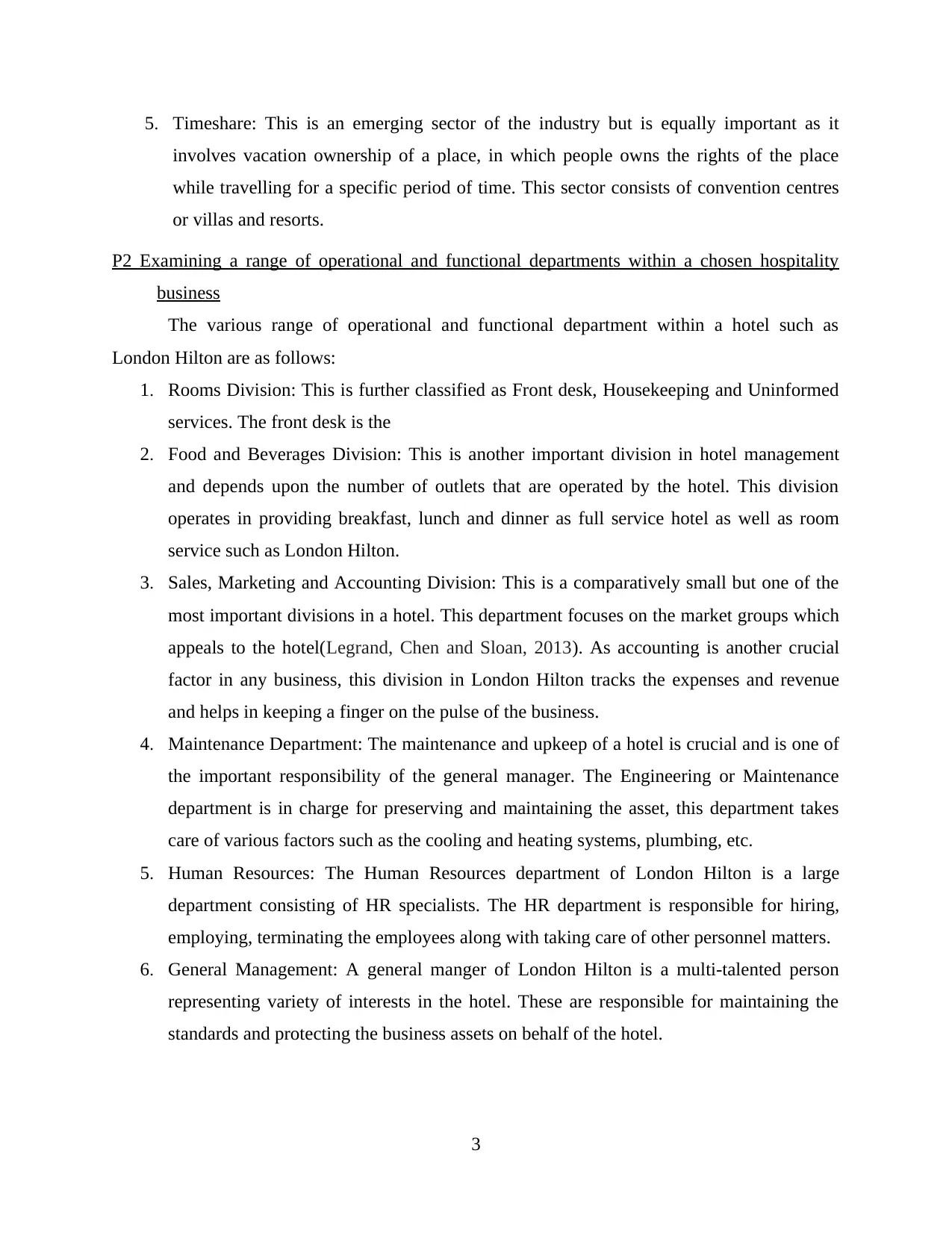
5. Timeshare: This is an emerging sector of the industry but is equally important as it
involves vacation ownership of a place, in which people owns the rights of the place
while travelling for a specific period of time. This sector consists of convention centres
or villas and resorts.
P2 Examining a range of operational and functional departments within a chosen hospitality
business
The various range of operational and functional department within a hotel such as
London Hilton are as follows:
1. Rooms Division: This is further classified as Front desk, Housekeeping and Uninformed
services. The front desk is the
2. Food and Beverages Division: This is another important division in hotel management
and depends upon the number of outlets that are operated by the hotel. This division
operates in providing breakfast, lunch and dinner as full service hotel as well as room
service such as London Hilton.
3. Sales, Marketing and Accounting Division: This is a comparatively small but one of the
most important divisions in a hotel. This department focuses on the market groups which
appeals to the hotel(Legrand, Chen and Sloan, 2013). As accounting is another crucial
factor in any business, this division in London Hilton tracks the expenses and revenue
and helps in keeping a finger on the pulse of the business.
4. Maintenance Department: The maintenance and upkeep of a hotel is crucial and is one of
the important responsibility of the general manager. The Engineering or Maintenance
department is in charge for preserving and maintaining the asset, this department takes
care of various factors such as the cooling and heating systems, plumbing, etc.
5. Human Resources: The Human Resources department of London Hilton is a large
department consisting of HR specialists. The HR department is responsible for hiring,
employing, terminating the employees along with taking care of other personnel matters.
6. General Management: A general manger of London Hilton is a multi-talented person
representing variety of interests in the hotel. These are responsible for maintaining the
standards and protecting the business assets on behalf of the hotel.
3
involves vacation ownership of a place, in which people owns the rights of the place
while travelling for a specific period of time. This sector consists of convention centres
or villas and resorts.
P2 Examining a range of operational and functional departments within a chosen hospitality
business
The various range of operational and functional department within a hotel such as
London Hilton are as follows:
1. Rooms Division: This is further classified as Front desk, Housekeeping and Uninformed
services. The front desk is the
2. Food and Beverages Division: This is another important division in hotel management
and depends upon the number of outlets that are operated by the hotel. This division
operates in providing breakfast, lunch and dinner as full service hotel as well as room
service such as London Hilton.
3. Sales, Marketing and Accounting Division: This is a comparatively small but one of the
most important divisions in a hotel. This department focuses on the market groups which
appeals to the hotel(Legrand, Chen and Sloan, 2013). As accounting is another crucial
factor in any business, this division in London Hilton tracks the expenses and revenue
and helps in keeping a finger on the pulse of the business.
4. Maintenance Department: The maintenance and upkeep of a hotel is crucial and is one of
the important responsibility of the general manager. The Engineering or Maintenance
department is in charge for preserving and maintaining the asset, this department takes
care of various factors such as the cooling and heating systems, plumbing, etc.
5. Human Resources: The Human Resources department of London Hilton is a large
department consisting of HR specialists. The HR department is responsible for hiring,
employing, terminating the employees along with taking care of other personnel matters.
6. General Management: A general manger of London Hilton is a multi-talented person
representing variety of interests in the hotel. These are responsible for maintaining the
standards and protecting the business assets on behalf of the hotel.
3
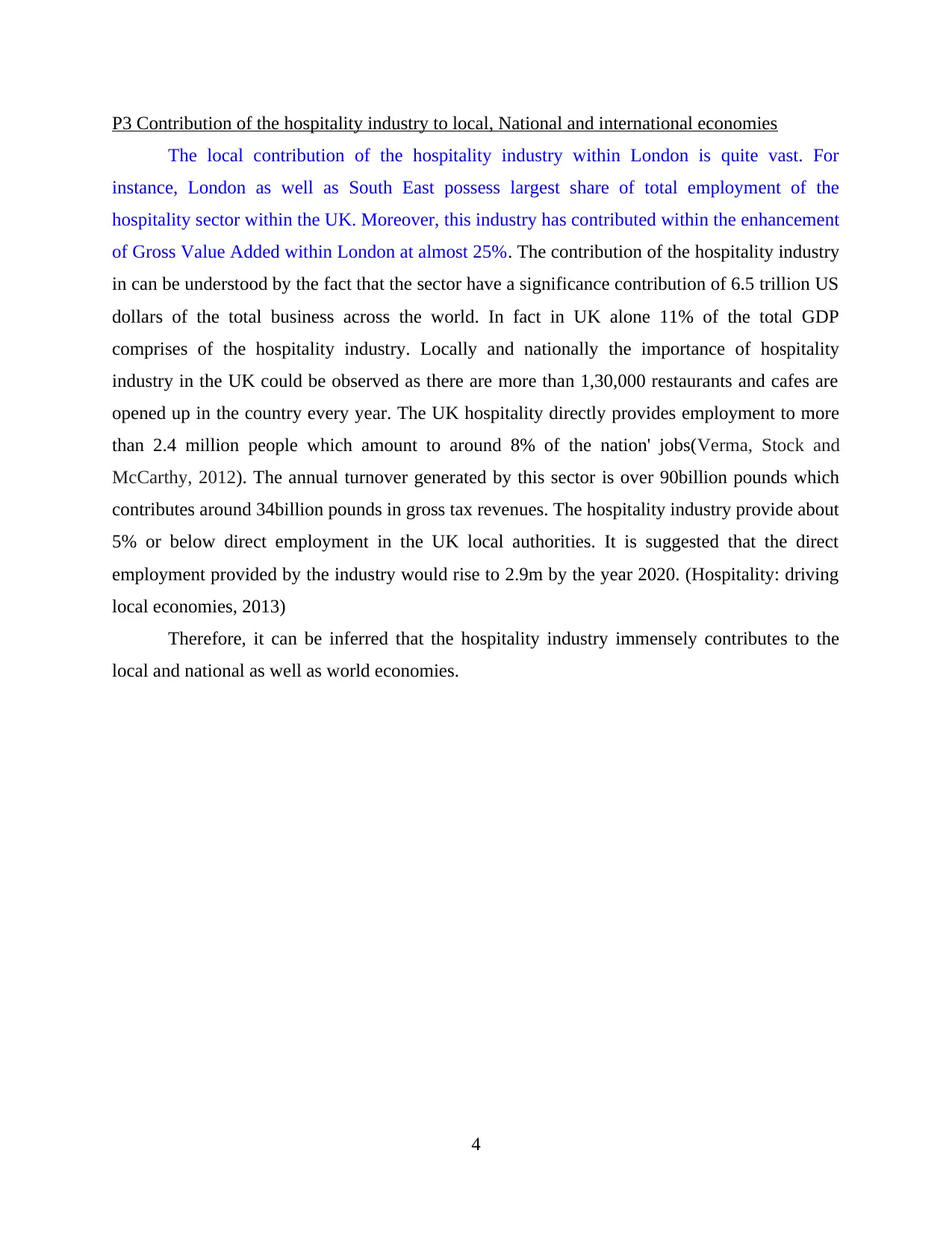
P3 Contribution of the hospitality industry to local, National and international economies
The local contribution of the hospitality industry within London is quite vast. For
instance, London as well as South East possess largest share of total employment of the
hospitality sector within the UK. Moreover, this industry has contributed within the enhancement
of Gross Value Added within London at almost 25%. The contribution of the hospitality industry
in can be understood by the fact that the sector have a significance contribution of 6.5 trillion US
dollars of the total business across the world. In fact in UK alone 11% of the total GDP
comprises of the hospitality industry. Locally and nationally the importance of hospitality
industry in the UK could be observed as there are more than 1,30,000 restaurants and cafes are
opened up in the country every year. The UK hospitality directly provides employment to more
than 2.4 million people which amount to around 8% of the nation' jobs(Verma, Stock and
McCarthy, 2012). The annual turnover generated by this sector is over 90billion pounds which
contributes around 34billion pounds in gross tax revenues. The hospitality industry provide about
5% or below direct employment in the UK local authorities. It is suggested that the direct
employment provided by the industry would rise to 2.9m by the year 2020. (Hospitality: driving
local economies, 2013)
Therefore, it can be inferred that the hospitality industry immensely contributes to the
local and national as well as world economies.
4
The local contribution of the hospitality industry within London is quite vast. For
instance, London as well as South East possess largest share of total employment of the
hospitality sector within the UK. Moreover, this industry has contributed within the enhancement
of Gross Value Added within London at almost 25%. The contribution of the hospitality industry
in can be understood by the fact that the sector have a significance contribution of 6.5 trillion US
dollars of the total business across the world. In fact in UK alone 11% of the total GDP
comprises of the hospitality industry. Locally and nationally the importance of hospitality
industry in the UK could be observed as there are more than 1,30,000 restaurants and cafes are
opened up in the country every year. The UK hospitality directly provides employment to more
than 2.4 million people which amount to around 8% of the nation' jobs(Verma, Stock and
McCarthy, 2012). The annual turnover generated by this sector is over 90billion pounds which
contributes around 34billion pounds in gross tax revenues. The hospitality industry provide about
5% or below direct employment in the UK local authorities. It is suggested that the direct
employment provided by the industry would rise to 2.9m by the year 2020. (Hospitality: driving
local economies, 2013)
Therefore, it can be inferred that the hospitality industry immensely contributes to the
local and national as well as world economies.
4
⊘ This is a preview!⊘
Do you want full access?
Subscribe today to unlock all pages.

Trusted by 1+ million students worldwide
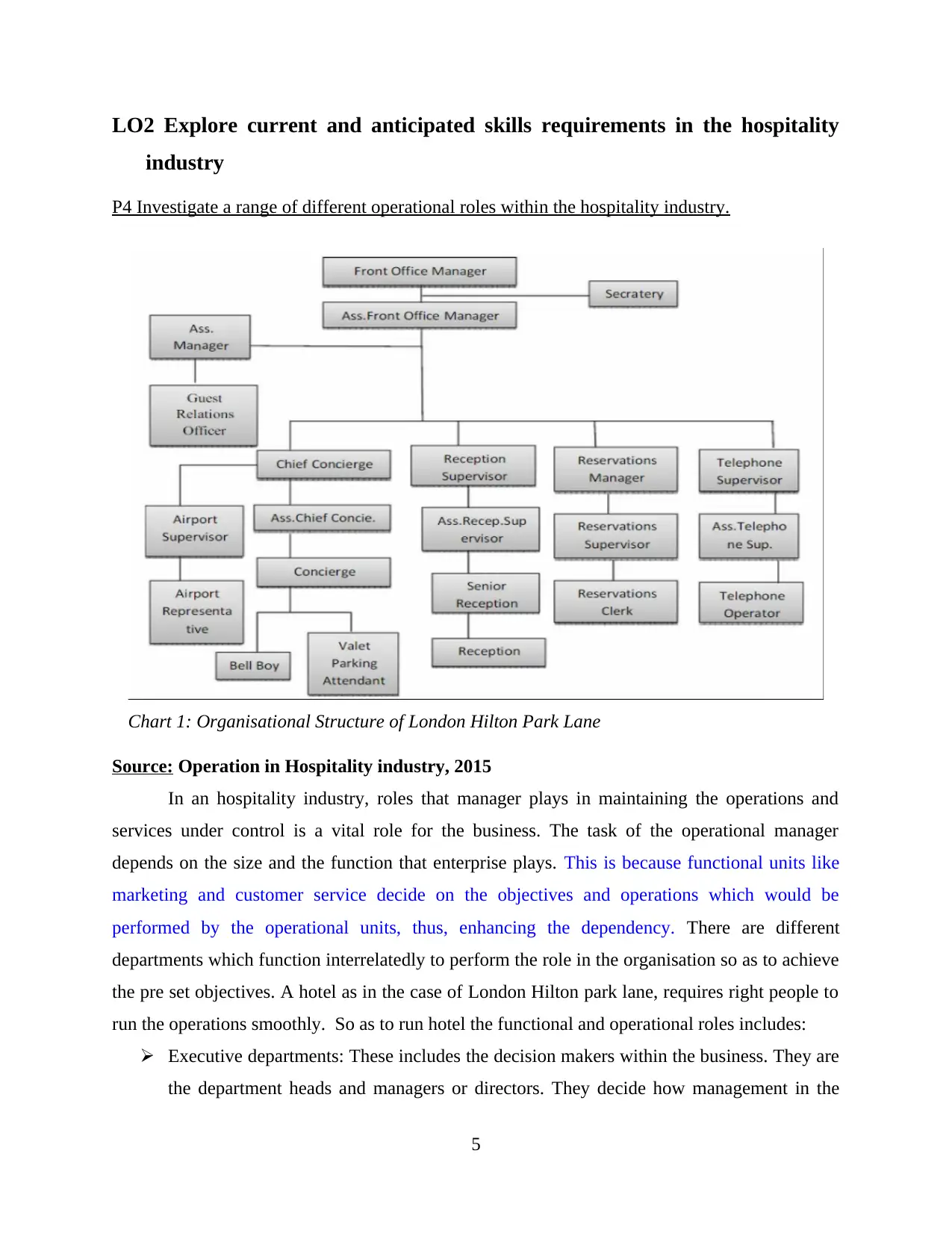
LO2 Explore current and anticipated skills requirements in the hospitality
industry
P4 Investigate a range of different operational roles within the hospitality industry.
Source: Operation in Hospitality industry, 2015
In an hospitality industry, roles that manager plays in maintaining the operations and
services under control is a vital role for the business. The task of the operational manager
depends on the size and the function that enterprise plays. This is because functional units like
marketing and customer service decide on the objectives and operations which would be
performed by the operational units, thus, enhancing the dependency. There are different
departments which function interrelatedly to perform the role in the organisation so as to achieve
the pre set objectives. A hotel as in the case of London Hilton park lane, requires right people to
run the operations smoothly. So as to run hotel the functional and operational roles includes:
Executive departments: These includes the decision makers within the business. They are
the department heads and managers or directors. They decide how management in the
5
Chart 1: Organisational Structure of London Hilton Park Lane
industry
P4 Investigate a range of different operational roles within the hospitality industry.
Source: Operation in Hospitality industry, 2015
In an hospitality industry, roles that manager plays in maintaining the operations and
services under control is a vital role for the business. The task of the operational manager
depends on the size and the function that enterprise plays. This is because functional units like
marketing and customer service decide on the objectives and operations which would be
performed by the operational units, thus, enhancing the dependency. There are different
departments which function interrelatedly to perform the role in the organisation so as to achieve
the pre set objectives. A hotel as in the case of London Hilton park lane, requires right people to
run the operations smoothly. So as to run hotel the functional and operational roles includes:
Executive departments: These includes the decision makers within the business. They are
the department heads and managers or directors. They decide how management in the
5
Chart 1: Organisational Structure of London Hilton Park Lane
Paraphrase This Document
Need a fresh take? Get an instant paraphrase of this document with our AI Paraphraser
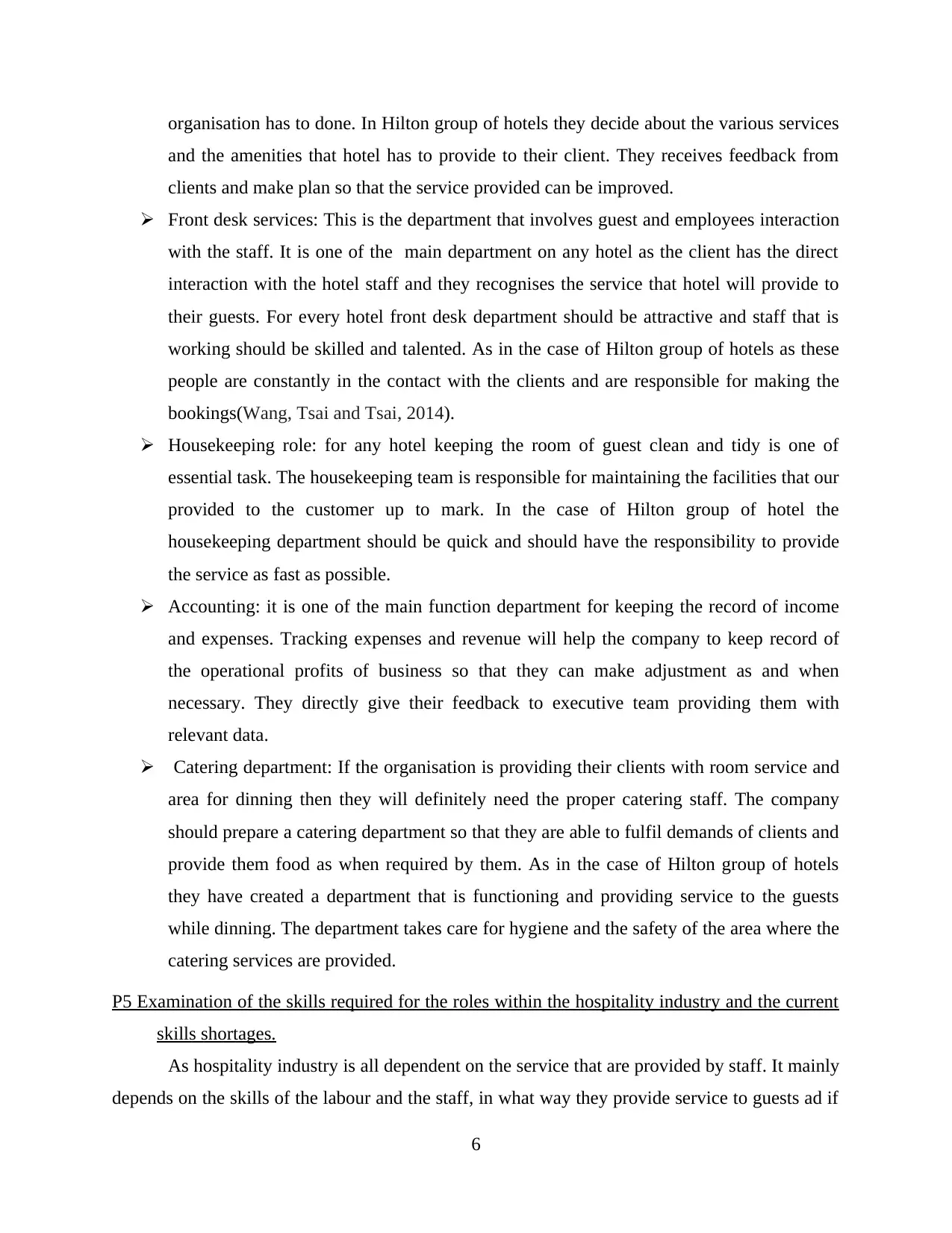
organisation has to done. In Hilton group of hotels they decide about the various services
and the amenities that hotel has to provide to their client. They receives feedback from
clients and make plan so that the service provided can be improved.
Front desk services: This is the department that involves guest and employees interaction
with the staff. It is one of the main department on any hotel as the client has the direct
interaction with the hotel staff and they recognises the service that hotel will provide to
their guests. For every hotel front desk department should be attractive and staff that is
working should be skilled and talented. As in the case of Hilton group of hotels as these
people are constantly in the contact with the clients and are responsible for making the
bookings(Wang, Tsai and Tsai, 2014).
Housekeeping role: for any hotel keeping the room of guest clean and tidy is one of
essential task. The housekeeping team is responsible for maintaining the facilities that our
provided to the customer up to mark. In the case of Hilton group of hotel the
housekeeping department should be quick and should have the responsibility to provide
the service as fast as possible.
Accounting: it is one of the main function department for keeping the record of income
and expenses. Tracking expenses and revenue will help the company to keep record of
the operational profits of business so that they can make adjustment as and when
necessary. They directly give their feedback to executive team providing them with
relevant data.
Catering department: If the organisation is providing their clients with room service and
area for dinning then they will definitely need the proper catering staff. The company
should prepare a catering department so that they are able to fulfil demands of clients and
provide them food as when required by them. As in the case of Hilton group of hotels
they have created a department that is functioning and providing service to the guests
while dinning. The department takes care for hygiene and the safety of the area where the
catering services are provided.
P5 Examination of the skills required for the roles within the hospitality industry and the current
skills shortages.
As hospitality industry is all dependent on the service that are provided by staff. It mainly
depends on the skills of the labour and the staff, in what way they provide service to guests ad if
6
and the amenities that hotel has to provide to their client. They receives feedback from
clients and make plan so that the service provided can be improved.
Front desk services: This is the department that involves guest and employees interaction
with the staff. It is one of the main department on any hotel as the client has the direct
interaction with the hotel staff and they recognises the service that hotel will provide to
their guests. For every hotel front desk department should be attractive and staff that is
working should be skilled and talented. As in the case of Hilton group of hotels as these
people are constantly in the contact with the clients and are responsible for making the
bookings(Wang, Tsai and Tsai, 2014).
Housekeeping role: for any hotel keeping the room of guest clean and tidy is one of
essential task. The housekeeping team is responsible for maintaining the facilities that our
provided to the customer up to mark. In the case of Hilton group of hotel the
housekeeping department should be quick and should have the responsibility to provide
the service as fast as possible.
Accounting: it is one of the main function department for keeping the record of income
and expenses. Tracking expenses and revenue will help the company to keep record of
the operational profits of business so that they can make adjustment as and when
necessary. They directly give their feedback to executive team providing them with
relevant data.
Catering department: If the organisation is providing their clients with room service and
area for dinning then they will definitely need the proper catering staff. The company
should prepare a catering department so that they are able to fulfil demands of clients and
provide them food as when required by them. As in the case of Hilton group of hotels
they have created a department that is functioning and providing service to the guests
while dinning. The department takes care for hygiene and the safety of the area where the
catering services are provided.
P5 Examination of the skills required for the roles within the hospitality industry and the current
skills shortages.
As hospitality industry is all dependent on the service that are provided by staff. It mainly
depends on the skills of the labour and the staff, in what way they provide service to guests ad if
6
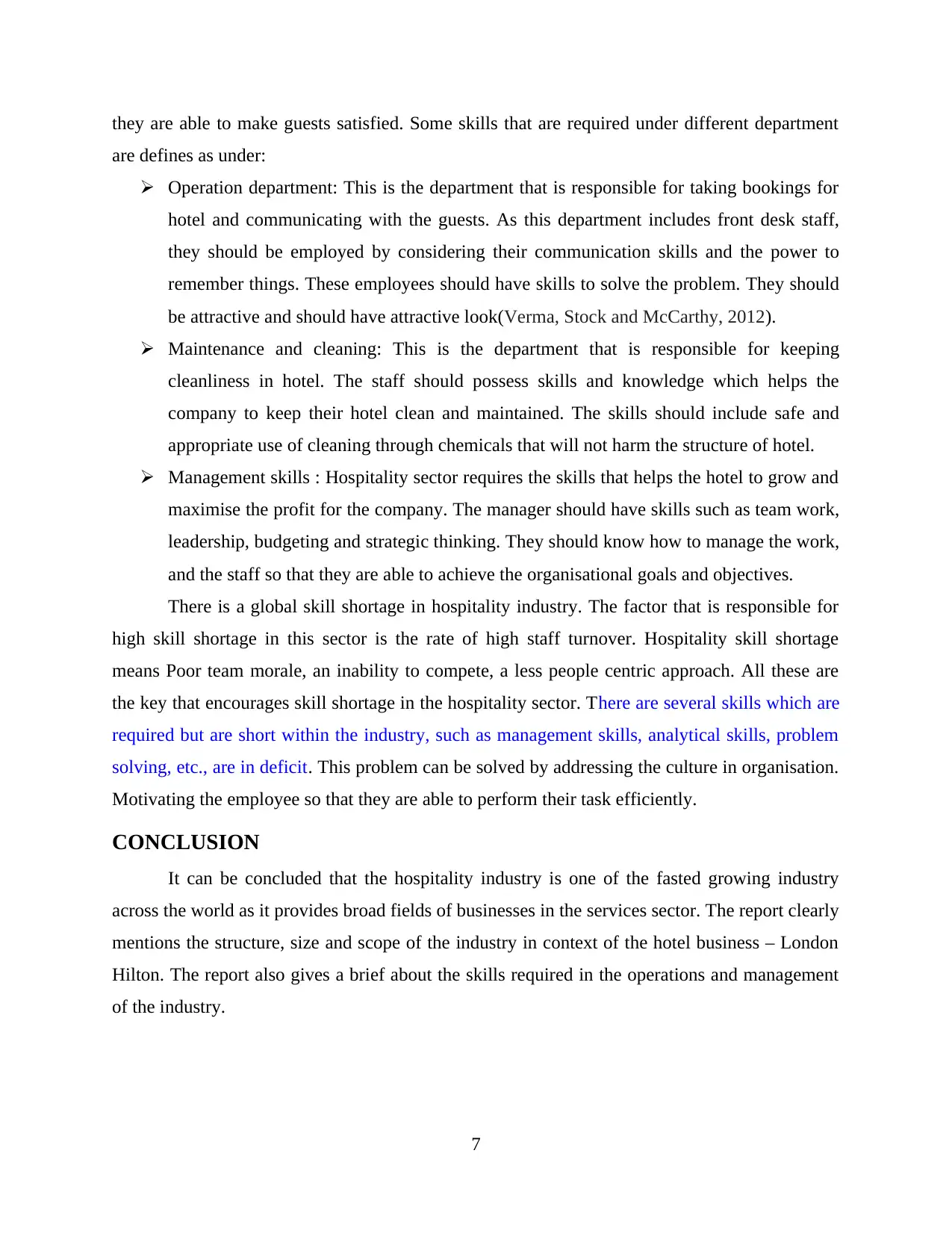
they are able to make guests satisfied. Some skills that are required under different department
are defines as under:
Operation department: This is the department that is responsible for taking bookings for
hotel and communicating with the guests. As this department includes front desk staff,
they should be employed by considering their communication skills and the power to
remember things. These employees should have skills to solve the problem. They should
be attractive and should have attractive look(Verma, Stock and McCarthy, 2012).
Maintenance and cleaning: This is the department that is responsible for keeping
cleanliness in hotel. The staff should possess skills and knowledge which helps the
company to keep their hotel clean and maintained. The skills should include safe and
appropriate use of cleaning through chemicals that will not harm the structure of hotel.
Management skills : Hospitality sector requires the skills that helps the hotel to grow and
maximise the profit for the company. The manager should have skills such as team work,
leadership, budgeting and strategic thinking. They should know how to manage the work,
and the staff so that they are able to achieve the organisational goals and objectives.
There is a global skill shortage in hospitality industry. The factor that is responsible for
high skill shortage in this sector is the rate of high staff turnover. Hospitality skill shortage
means Poor team morale, an inability to compete, a less people centric approach. All these are
the key that encourages skill shortage in the hospitality sector. There are several skills which are
required but are short within the industry, such as management skills, analytical skills, problem
solving, etc., are in deficit. This problem can be solved by addressing the culture in organisation.
Motivating the employee so that they are able to perform their task efficiently.
CONCLUSION
It can be concluded that the hospitality industry is one of the fasted growing industry
across the world as it provides broad fields of businesses in the services sector. The report clearly
mentions the structure, size and scope of the industry in context of the hotel business – London
Hilton. The report also gives a brief about the skills required in the operations and management
of the industry.
7
are defines as under:
Operation department: This is the department that is responsible for taking bookings for
hotel and communicating with the guests. As this department includes front desk staff,
they should be employed by considering their communication skills and the power to
remember things. These employees should have skills to solve the problem. They should
be attractive and should have attractive look(Verma, Stock and McCarthy, 2012).
Maintenance and cleaning: This is the department that is responsible for keeping
cleanliness in hotel. The staff should possess skills and knowledge which helps the
company to keep their hotel clean and maintained. The skills should include safe and
appropriate use of cleaning through chemicals that will not harm the structure of hotel.
Management skills : Hospitality sector requires the skills that helps the hotel to grow and
maximise the profit for the company. The manager should have skills such as team work,
leadership, budgeting and strategic thinking. They should know how to manage the work,
and the staff so that they are able to achieve the organisational goals and objectives.
There is a global skill shortage in hospitality industry. The factor that is responsible for
high skill shortage in this sector is the rate of high staff turnover. Hospitality skill shortage
means Poor team morale, an inability to compete, a less people centric approach. All these are
the key that encourages skill shortage in the hospitality sector. There are several skills which are
required but are short within the industry, such as management skills, analytical skills, problem
solving, etc., are in deficit. This problem can be solved by addressing the culture in organisation.
Motivating the employee so that they are able to perform their task efficiently.
CONCLUSION
It can be concluded that the hospitality industry is one of the fasted growing industry
across the world as it provides broad fields of businesses in the services sector. The report clearly
mentions the structure, size and scope of the industry in context of the hotel business – London
Hilton. The report also gives a brief about the skills required in the operations and management
of the industry.
7
⊘ This is a preview!⊘
Do you want full access?
Subscribe today to unlock all pages.

Trusted by 1+ million students worldwide
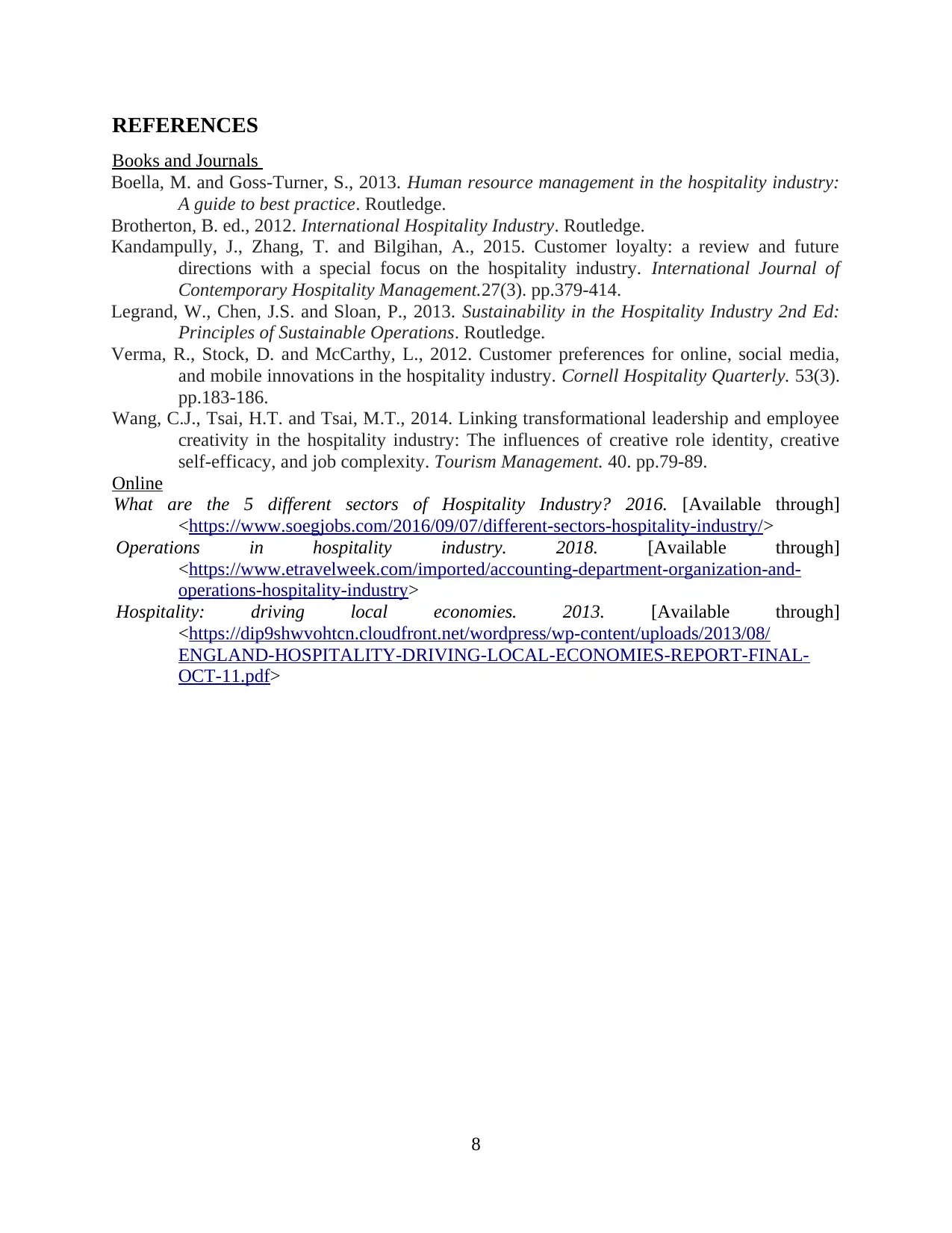
REFERENCES
Books and Journals
Boella, M. and Goss-Turner, S., 2013. Human resource management in the hospitality industry:
A guide to best practice. Routledge.
Brotherton, B. ed., 2012. International Hospitality Industry. Routledge.
Kandampully, J., Zhang, T. and Bilgihan, A., 2015. Customer loyalty: a review and future
directions with a special focus on the hospitality industry. International Journal of
Contemporary Hospitality Management.27(3). pp.379-414.
Legrand, W., Chen, J.S. and Sloan, P., 2013. Sustainability in the Hospitality Industry 2nd Ed:
Principles of Sustainable Operations. Routledge.
Verma, R., Stock, D. and McCarthy, L., 2012. Customer preferences for online, social media,
and mobile innovations in the hospitality industry. Cornell Hospitality Quarterly. 53(3).
pp.183-186.
Wang, C.J., Tsai, H.T. and Tsai, M.T., 2014. Linking transformational leadership and employee
creativity in the hospitality industry: The influences of creative role identity, creative
self-efficacy, and job complexity. Tourism Management. 40. pp.79-89.
Online
What are the 5 different sectors of Hospitality Industry? 2016. [Available through]
<https://www.soegjobs.com/2016/09/07/different-sectors-hospitality-industry/>
Operations in hospitality industry. 2018. [Available through]
<https://www.etravelweek.com/imported/accounting-department-organization-and-
operations-hospitality-industry>
Hospitality: driving local economies. 2013. [Available through]
<https://dip9shwvohtcn.cloudfront.net/wordpress/wp-content/uploads/2013/08/
ENGLAND-HOSPITALITY-DRIVING-LOCAL-ECONOMIES-REPORT-FINAL-
OCT-11.pdf>
8
Books and Journals
Boella, M. and Goss-Turner, S., 2013. Human resource management in the hospitality industry:
A guide to best practice. Routledge.
Brotherton, B. ed., 2012. International Hospitality Industry. Routledge.
Kandampully, J., Zhang, T. and Bilgihan, A., 2015. Customer loyalty: a review and future
directions with a special focus on the hospitality industry. International Journal of
Contemporary Hospitality Management.27(3). pp.379-414.
Legrand, W., Chen, J.S. and Sloan, P., 2013. Sustainability in the Hospitality Industry 2nd Ed:
Principles of Sustainable Operations. Routledge.
Verma, R., Stock, D. and McCarthy, L., 2012. Customer preferences for online, social media,
and mobile innovations in the hospitality industry. Cornell Hospitality Quarterly. 53(3).
pp.183-186.
Wang, C.J., Tsai, H.T. and Tsai, M.T., 2014. Linking transformational leadership and employee
creativity in the hospitality industry: The influences of creative role identity, creative
self-efficacy, and job complexity. Tourism Management. 40. pp.79-89.
Online
What are the 5 different sectors of Hospitality Industry? 2016. [Available through]
<https://www.soegjobs.com/2016/09/07/different-sectors-hospitality-industry/>
Operations in hospitality industry. 2018. [Available through]
<https://www.etravelweek.com/imported/accounting-department-organization-and-
operations-hospitality-industry>
Hospitality: driving local economies. 2013. [Available through]
<https://dip9shwvohtcn.cloudfront.net/wordpress/wp-content/uploads/2013/08/
ENGLAND-HOSPITALITY-DRIVING-LOCAL-ECONOMIES-REPORT-FINAL-
OCT-11.pdf>
8
1 out of 10
Related Documents
Your All-in-One AI-Powered Toolkit for Academic Success.
+13062052269
info@desklib.com
Available 24*7 on WhatsApp / Email
![[object Object]](/_next/static/media/star-bottom.7253800d.svg)
Unlock your academic potential
Copyright © 2020–2025 A2Z Services. All Rights Reserved. Developed and managed by ZUCOL.





